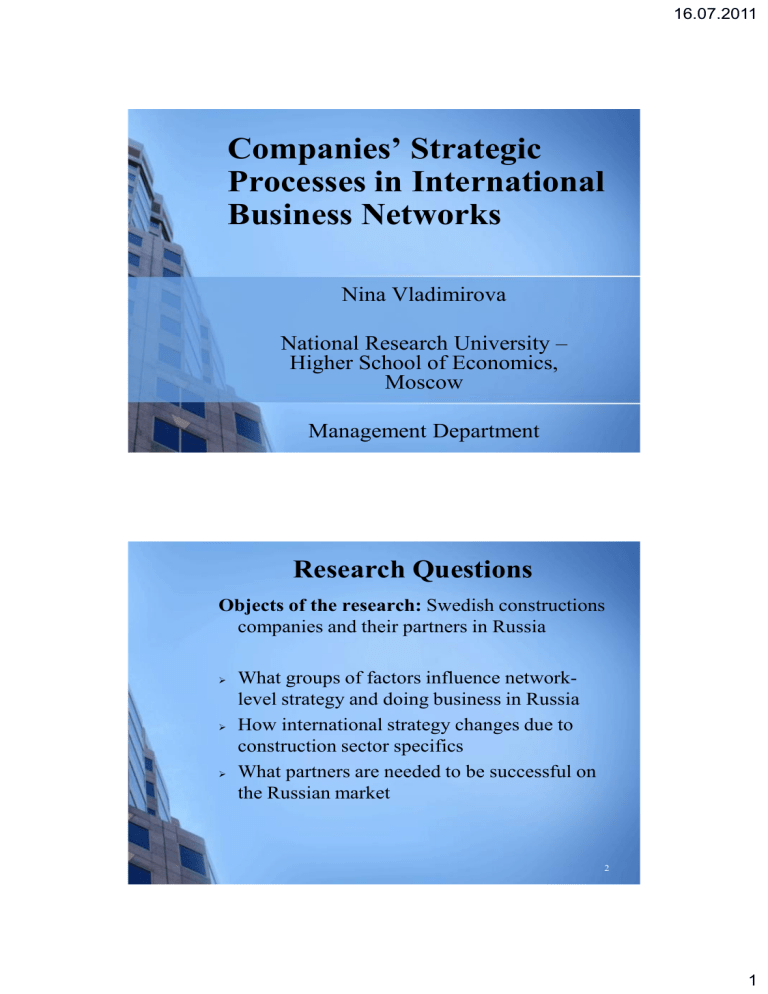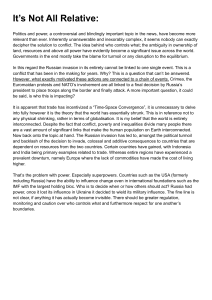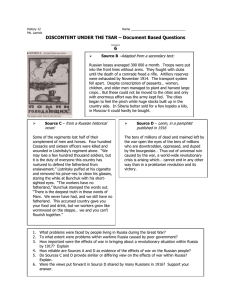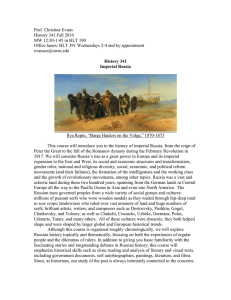Companies' Strategic Processes in International Business Networks

Companies’ Strategic
Processes in International
Business Networks
Nina Vladimirova
National Research University –
Higher School of Economics,
Moscow
Management Department
Research Questions
Objects of the research: Swedish constructions companies and their partners in Russia
What groups of factors influence networklevel strategy and doing business in Russia
How international strategy changes due to construction sector specifics
What partners are needed to be successful on the Russian market
2
16.07.2011
1
Methodology and data collection
Methodology: case-analysis
Main data source:
Structured in-depth interviews using 60-questions questionnaire
Companies’ internal documents
Secondary Data from WEF, WB, Rosstat,
Datamonitor etc.
3
Literature review
Jarillo, Granovetter,
Miles & Snow, Moore,
Williamson, Ford,
Hakansson & Snehota,
Kogut, Dyer & Singh,
Moller & Rajala
Network theories
Dunning & Lundan,
Kotler, Prahalad & Doz,
Bartlett & Ghoshal,
Ghemawat, Meyer &
Estrin
International strategies
Lack in including inter-organizational connections into international strategies
4
16.07.2011
2
Network-level strategy
16.07.2011
5
RESEARCH RESULTS
6
3
Factors, influencing network-level strategy (institutional context)
Russia
Traditional industrial society
Low firm-level of technology absorption
Traditional market relations through contracts
Poor integration into international processes
Finland
Information society in
Finland
Rapid innovation development
Knowledge generation through new technologies
Development of network collaboration
7
Factors, influencing network-level strategy (industry context)
Project nature of business
Choice of partners is realized on the first stage of projects
It is difficult to change partners after a project start
Project can involve different partners, both from a current network and outside it
8
16.07.2011
4
Barriers to developing network in Russia
Different stages of economic development
Differences in industry standards and regulations
Non-transparent procedures of tenders
High level of corruption and economic crimes
Poorly developed net of SME
Lack of trust from the Russian partners
9
International strategies in the construction sector
Three of four companies adhere to multinational strategy with certain account of local features
Arguments in favor:
Peculiarities of the Russian law and business practice
Project specify of the construction sector requires individual lead-up in business
Argument against:
Total quality management requires the same standards in different business units
10
16.07.2011
5
International strategies in the construction sector
Global strategy Transtnaional strategy
2
1
3
Multilocal strategy
4
Stage 1 – preconstruction
Stage 2 – contract award
Stage 3 – building and construction works
Stage 4 – exploitation
Multinational strategy
Consideration of local differences
11
Types of partners in the construction sector
Companies, possessing unique knowledge about the market
(A-connections)
Consulting companies
Environmentservices company
Exploratory companies
Subcontractor
Projecting companies
Designer bureau
General
Contractor
Value-chain partners (V-connections)
Investor Co-invesotor
Developer Building owner
General design engineer
Road-construction and infrastructure companies
Investor
End-buyer
Developer
Local authorities
Insurance companies
Banks
Large selfregulating organizations
Companies, providing business stability (S-connections)
Financial industrial group
12
16.07.2011
6
Conclusions
Choice of an international strategy and its implementation depend on institutional, cultural and local features.
Network configuration depends both on context factors and presence of other divisions in the market
Project specificity of the construction business limits customers’ and suppliers’ choice after the first stage
Priority partnership relations are chosen according to companies’ international strategy
Degree of localization or globalization in international strategies changes depending on stages of the project
Three different groups of partners can be defined
13
16.07.2011
THANK YOU FOR ATTENTION!
14
7











